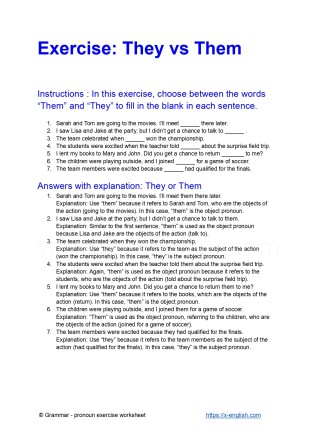They vs Them: What’s the Difference?
The terms “they” and “them” are both pronouns in the English language, but they serve different grammatical functions. So, let’s explore ‘They’ vs ‘Them’.
They:
- Subject Pronoun: “They” is commonly used as a subject pronoun. It is used to refer to a group of people, animals, or things.
- Example: They went to the store.
Them:
- Object Pronoun: “Them” is typically used as an object pronoun. It is used when the group of people, animals, or things is the object of a verb or preposition.
- Example: The teacher gave them a homework assignment.
- Emphatic Use: “Them” can also be used for emphasis in informal speech.
- Example: I told them to be quiet!
In summary, “they” is used as the subject pronoun, while “them” is used as the object pronoun. Both pronouns are essential for clear and effective communication in English.
Choosing ‘They’ and ‘Them’ in Different Sentence Structures
- The neighbors invited us to a barbecue, so we brought a gift for them.
Explanation: Similar to the first two sentences, “them” is used as the object pronoun because it refers to the neighbors, who are the objects of the action (brought a gift for). - Lisa and Peter have a lot in common, so I introduced them to each other.
Explanation: “Them” is used as the object pronoun, referring to Lisa and Peter, who are the objects of the action (introduced to each other). - The teacher praised the students because they had worked hard on the group project.
Explanation: Use “they” because it refers to the students as the subject of the action (had worked hard on the group project). In this case, “they” is the subject pronoun. - We invited our neighbors to the party, and they brought delicious homemade cookies.
Explanation: Similar to the previous sentences, “they” is used as the subject pronoun because it refers to the neighbors as the subject of the action (brought delicious homemade cookies).
For a deeper understanding of personal pronouns, be sure to read “How to Use Personal Pronouns“
Lets Practice : ‘They’ vs ‘Them’
Difficulty Level : Intermediate / Proficient / Advanced / Skilled
Instructions : In this exercise, choose between the words “Them” and “They” to fill in the blank in each sentence.
- Sarah and Tom are going to the movies. I’ll meet ______ there later.
- I saw Lisa and Jake at the party, but I didn’t get a chance to talk to ______ .
- The team celebrated when ______ won the championship.
- The students were excited when the teacher told ______ about the surprise field trip.
- I lent my books to Mary and John. Did you get a chance to return _______ to me?
- The children were playing outside, and I joined ______ for a game of soccer.
- The team members were excited because ______ had qualified for the finals.
Answers with explanation: They or Them
- Sarah and Tom are going to the movies. I’ll meet them there later.
Explanation: Use “them” because it refers to Sarah and Tom, who are the objects of the action (going to the movies). In this case, “them” is the object pronoun. - I saw Lisa and Jake at the party, but I didn’t get a chance to talk to them.
Explanation: Similar to the first sentence, “them” is used as the object pronoun because Lisa and Jake are the objects of the action (talk to). - The team celebrated when they won the championship.
Explanation: Use “they” because it refers to the team as the subject of the action (won the championship). In this case, “they” is the subject pronoun. - The students were excited when the teacher told them about the surprise field trip.
Explanation: Again, “them” is used as the object pronoun because it refers to the students, who are the objects of the action (told about the surprise field trip). - I lent my books to Mary and John. Did you get a chance to return them to me?
Explanation: Use “them” because it refers to the books, which are the objects of the action (return). In this case, “them” is the object pronoun. - The children were playing outside, and I joined them for a game of soccer.
Explanation: “Them” is used as the object pronoun, referring to the children, who are the objects of the action (joined for a game of soccer). - The team members were excited because they had qualified for the finals.
Explanation: Use “they” because it refers to the team members as the subject of the action (had qualified for the finals). In this case, “they” is the subject pronoun.
